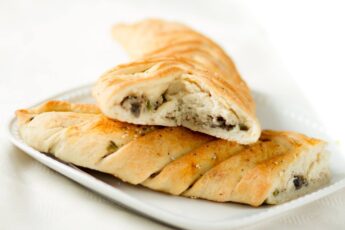By Shaista Tariq
Cheese is a nutritious food made mostly from the milk of cows as well as other mammals, including sheep, goats, buffalo, reindeer, camels and yaks. Cheese has been around for thousands of years, when people first started to breed animals and process their milk.
In the Muslim milieu, cheese and dairy products raise a lot of questions about whether or not some of their ingredients are derived from a halal source. Rennet in particular, is a mushbooh ingredient that needs to be investigated further.
Rennet
Rennet is an ingredient used to make cheese coagulate quicker. The primary enzyme (chymosin) found in rennet is most often collected from the lining of the fourth stomach of a newborn calf where the enzyme is produced to help baby cows digest milk. A secondary source of rennet is piglets, which also use the enzyme in the digestion process. This can be a problem if you are a vegetarian who eats cheese or are looking for halal cheese.
Vegetarian Rennet
Enzymes collected from vegetable sources are harvested from plants in the making of vegetable rennet. These plants include fig leaves, melons, safflower and wild thistles. The enzymes produced by these plants will also curdle milk.
Microbial Rennet
These are enzymes derived from the growth of cultures and mold such as Mucor miehei, Bacillus subtilis or Bacillus prodigiosum. Since these enzymes are not taken from an animal and because their cultures are easy to grow, microbial rennet is becoming increasingly popular.
Genetically Engineered Rennet
In some cases the enzymes labeled vegetarian rennet are manufactured by using genetically altered rennet. In this case, the chymosin DNA is taken from a calfs stomach cells and altered. However, this is not always the case with manufactured enzymes. They can also be bio-synthesized without the cells of an animal. Genetically engineered chymosin has no relation to the animal. This makes it suitable for vegetarians, although stricter vegetarians and vegans may still prefer microbial or vegetable -based cheeses.
Make your own cheese
If you want to try something simpler and halal for sure, this is a recipe for goat’s milk or Feta cheese that you can easily make at home.
Ingredients
1 quart goats milk (pasteurized is fine, but dont use ultra-pasteurized)
1/3 cup fresh lemon juice
salt to taste
Tools
First, gather these things:
Non-reactive pot: A non-reactive pot is important because certain metals, such as aluminum, will leach into the milk. Use a stainless steel pot to avoid this.
Thermometer: You can get away with not using a thermometer by knowing what the milk looks like when it reaches 180 – 185 F. It will be nearing a simmer, with bubbles forming. However, youre more likely to have consistently successful results if you use a thermometer.
Cheesecloth
Strainer
Wood or stainless-steel spoon with a long handle
Instructions
Slowly heat the milk on the stove until it reaches 180 – 185 degrees. Gentle bubbles should be forming and the surface will look foamy. Turn off heat at this point.
Stir in the lemon juice then let the milk sit for 10 minutes. The milk should curdle and become slightly thicker on the surface.
Line a colander with two layers of cheese cloth. Gently pour the milk into the cheese cloth then gather the cheesecloth up around the curds and tie it into a bundle. Secure it with an elastic band or clip to hold the cheese cloth together at the top.
Hang the bundle over a pot or jar so the liquid can drip out. (You can do this by attaching the bundle to a wooden spoon or a ladle and setting the spoon over the top of the pot or jar.)
Let the cheese drain for at least 1 1/2 hours. Scrape the cheese into a bowl. Stir in salt and/or other ingredients to taste.
Use your hands to pat and shape the cheese into a small wheel or log. You can also use a cookie cutter as a mold to shape the cheese. After the cheese is made you can add herbs, spices or garlic to enhance its flavour
The flavour and texture of the cheese usually improves if you refrigerate it for a few hours before serving. The goat cheese should stay fresh in the refrigerator for one week.
Enjoy some homemade goodness!
About the author:
Shaista Tariq is an M.Sc., B.Sc. in Applied Science in Nutrition and a Registered Holistic Nutritionist.






Leave a Comment